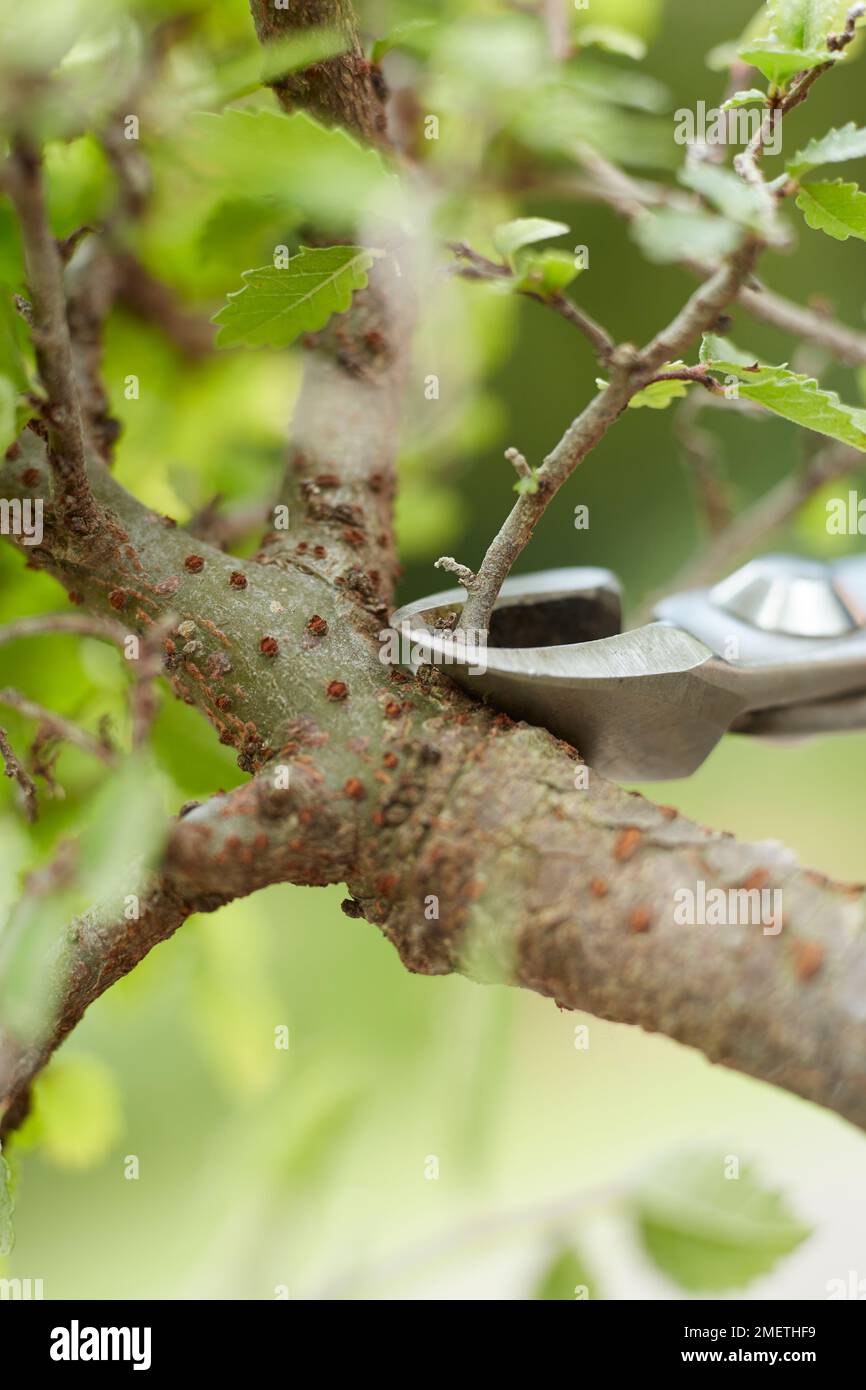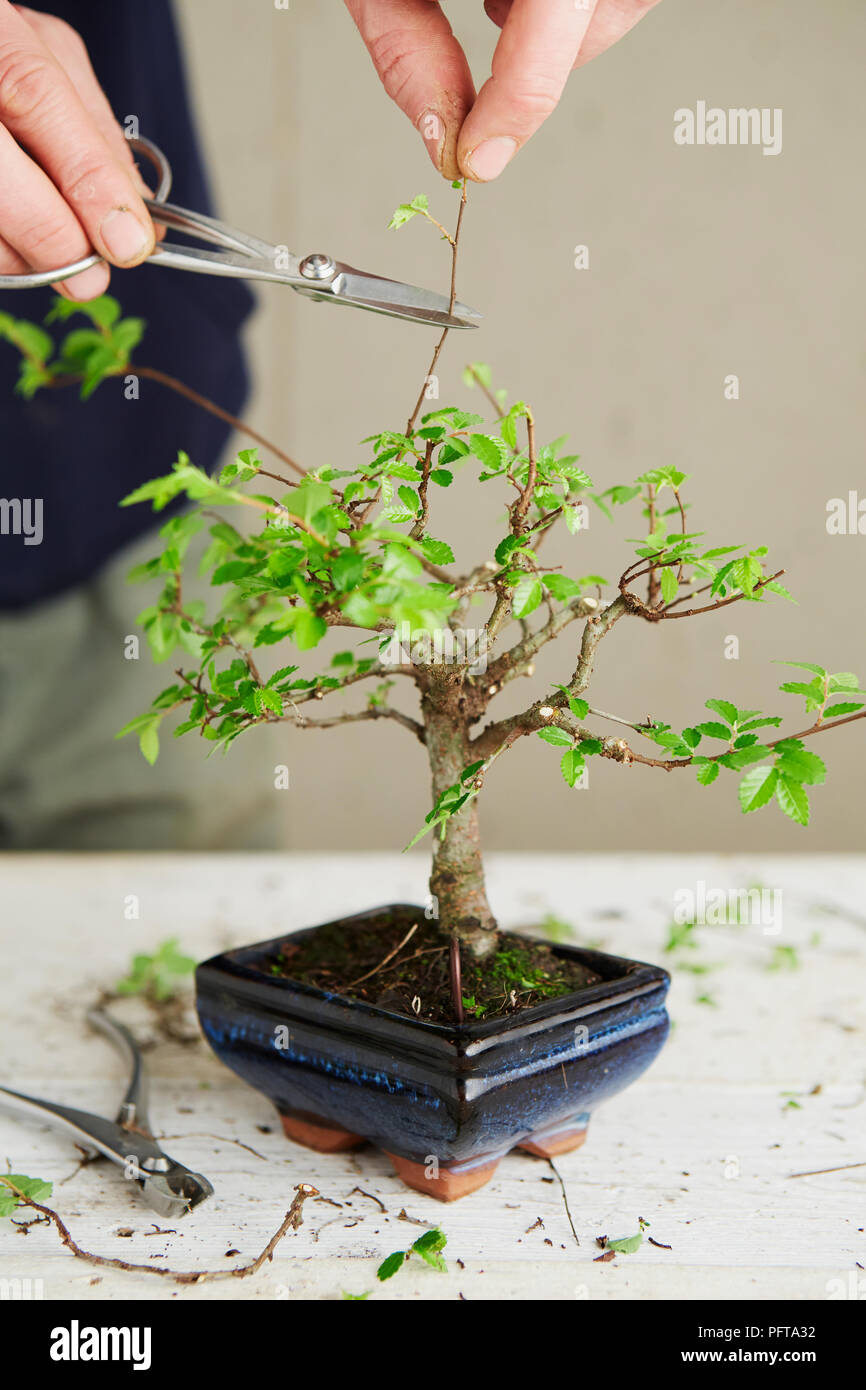
How to Prune a Chinese Elm Tree Hunker
Chinese or lacebark elm ( Ulmus parvifolia) is a mid-sized tree that is hardy in USDA zones 4 to 9. It is a good idea to prune young trees to create a well spaced, sturdy tree at maturity. Pruning when your tree has the strongest natural defense system will give it the best chance to defend itself against pests and disease.

How do I prune my Chinese Elm Bonsai Tree? Bonsai Trees for Sale UK
The Chinese Elm is a beautiful and popular Bonsai tree. In its natural state, it's a fast-growing tree that can reach a full height of up to 50 or 60 feet in about 15 years. So obviously, if it's going to be a Bonsai tree, it will need regular shaping and pruning to keep it small enough to fit into a bonsai container or pot.

90 Chinese Elms Pruning YouTube
When pruning Chinese elm trees, it is recommended to follow these steps: Understand the growth habit: Chinese elm trees have a naturally graceful, vase-shaped growth habit. The main branches grow upward and outward, creating a beautiful canopy. Understanding the growth habit will help in determining which branches should be pruned.

Pruning my Chinese Elm YouTube
Proper pruning is essential with Chinese elm and other elm trees. Prune them selectively to help them develop one dominant trunk, and remove any low-hanging limbs early to create adequate clearance under the tree. These trees typically grow forty to fifty feet tall and thirty-five to fifty feet wide, making them suitable for many smaller yards.

Bonsai Chinese Elm /Pruning/ Top 3 Tips YouTube
If you are an avid gardener or simply wish to enhance the appearance of your trees, you may have found yourself intrigued by the art of Chinese Elm pruning. This technique allows you to shape your tree into a desired…

Pruning Deciduous Bonsai 2 Chinese Elm Bonsai Bark
23917 · Change Location Home and Garden | Gardening | Soil Care How to Prune Chinese Elms By Kristi Waterworth Updated April 4, 2012 10:31 p.m. Chinese elm (Ulmus parvifolia) is a common urban tree because of its willingness to be planted in a contained space--such as along a sidewalk--and its graceful, slightly weeping habit.

How to Prune a Chinese Elm Bonsai Tree EASY!!! Peter Chan YouTube
Placement The Chinese elm thrives in either full sun and/or partial shade. In temperate climates, it can be left outdoors even during winter months. If you have an indoor Chinese Elm Bonsai you can place it outside during the summer, but it's best to bring it into a cool, but frost-free, room in the winter.

Chinese Elm Pruning. Part 2! Greenwood Bonsai YouTube
The Chinese elm ( Ulmus parvifolia) is native to China, North Korea, Japan, and Taiwan. It is commonly known as lacebark elm. The plant is hardy, growing in USDA zones 5 through 10. Whether it is deciduous or evergreen depends on the climate in which it grows. In a continuously warm climate, the shrub is evergreen. The species grows very quickly.

How to Prune a Chinese Elm Bonsai 2 Key Techniques YouTube
When to Prune Timing is crucial when it comes to pruning your Chinese Elm bonsai. You can either prune Chinese Elms in early spring or in late summer: Early Spring: This is the primary pruning season. It's when you perform structural pruning to shape the bonsai and remove any dead or unhealthy branches.

pruning Chinese Elm (Ulmus parvifolia Stock Photo Alamy
A Chinese elm tree can be grown in two primary forms -- the ordinary tree, which can grow to be 60 feet tall or more, and the bonsai form, which is a miniature version of the large tree. Both types of trees need regular pruning to remain healthy, although the full-size Chinese elm needs much less attention than its bonsai counterpart.

Chinese Elm Bonsai Part V Final Touch Up Pruning after the repot YouTube
Second, the sample only represents the Chinese target population, and thus the generalization of findings is limited because of the unique institutional, political and economic environments. Future research should address this limitation by conducting studies cross-nationally and including control variables that consider political, economic.

Ulmus parviflora (Chinese Elm), pruning branches Stock Photo Alamy
Sparse foliage, leggy growth, and weak branches. Solution: Place your Chinese Elm bonsai in a location with bright, indirect sunlight. Rotate the tree periodically to ensure even exposure. If natural light is insufficient, consider using grow lights. 5. Improper Pruning and Wiring. Symptoms: Unnatural or damaged branches, scars, and stunted growth.

Styling Series XL Chinese Elm Maintenance Pruning YouTube
0:00 / 5:48 How to Prune a Chinese Elm Bonsai Tree EASY!!! - Peter Chan Herons Bonsai 456K subscribers Subscribe Subscribed 393K views 6 years ago Peter Chan's guide to pruning a Chinese elm.

Chinese Elm Bonsai Pruning and Repotting YouTube
Have you ever wondered how to prune a Chinese Elm tree? When trimming these trees, we typically elevate the lower limbs to increase vertical clearance, prune out the dead limbs, and most.

Chinese Elm Bonsai Tree Pruning Basic Clip and Grow YouTube
When to Prune Your Chinese Elm. The best time to prune your Chinese elm is during the dormant winter months. Avoid pruning during the growing season as this can impact the growth and health of the tree. Techniques for Pruning Chinese Elm Trees. There are several techniques for pruning Chinese elm trees. The most common include:

Chinese Elm Tree, After Pruning. Yelp
Chinese elm is hardy to about twenty degrees Fahrenheit. The tree requires minor pruning for clearance beneath its canopy and to develop a strong structure. It also needs light maintenance to rake up leaf drop in the winter. Prune and remove suckers that may re-sprout in other parts of the landscape.